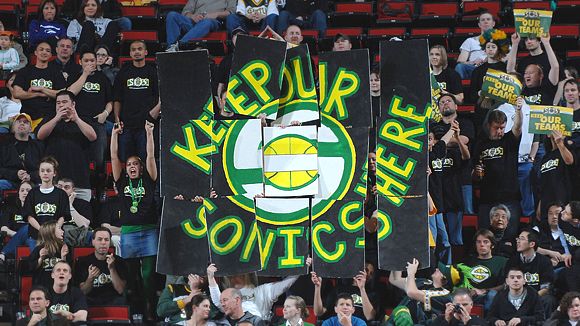
Terrence Vaccaro/Getty Images
Apparently, signs like this one weren't enough to keep the Sonics in Seattle.
The NBA should be banned from using the phrase "NBA cares" in any future public service announcement.
That should be a contingency of the settlement that ended the city of Seattle's lawsuit against the SuperSonics and freed the team to move to Oklahoma City, Okla. Because that's the message the sad Sonics saga sends out. The league doesn't care one bit unless you're willing to give up your money to enable its profits.
We know the NBA isn't a philanthropic organization, no matter how many times we see pictures of players reading to kids. We understand teams must seek maximum profits or else they may be sold or cease to exist. But that doesn't mean the public has to guarantee that the team will make money.
The hypocritical Sonics owners argued in court that the team's departure would have no economic impact on Seattle. Wonder how that went over with the voters in Oklahoma City who approved a $121 million sales tax extension to pay for arena renovations because they were told it would be an economic boon to the city.
As I write this in a Washington, D.C., hotel room, just a few blocks away is an example that there's no steadfast rule that says arenas must be built with taxpayer funds. Washington Wizards owner Abe Pollin financed the $200 million to build the Verizon Center himself. In the process, he provided the impetus that turned a forgotten part of the city into a bustling area of restaurants, shops and bars.
That's an example of what a franchise can mean to a city. It can provide a community base and, in good times, unify the region.
There's a conversation starter when you see someone wearing the home team's jersey on the subway. There's a downtown parade when the team wins a championship. Even the sports economists whose numbers can't provide a fiscal justification for keeping pro teams in town say there's an incalculable psychological benefit.
I was there for the last glorious night of basketball in Seattle. The Sonics didn't even win a championship that night, all they did was win Game 5 of the NBA Finals to send the series with the Bulls back to Chicago. Fans rallied for an impromptu celebration at Pioneer Square and drove around the city honking their horns deep into the night.
Those are the types of feelings that were torn away from Seattle on Wednesday. Four decades of support from the fans were tossed aside.
(So far I have discovered only one good thing to come out of this. In the comments section on the Seattle Post-Intelligencer's Web site Wednesday night, an angry Sonics fan posted a link to a picture I've unsuccessfully tried to find on the Internet for years: the shot of Xavier McDaniel choking Wes Matthews.)
So how could this brazen pillaging happen?
The short summary is that the city and state did not pay for a new or renovated arena, so that's all the excuse the SuperSonics' owners need to hijack the franchise to their hometown in Oklahoma. The city tried to sue to force the Sonics to honor the remaining two years on their lease at KeyArena. The owners argued they would lose some $60 million if they stayed that long. So they wrote a check for $45 million (with the possibility of writing another for $30 million if certain conditions are met) and the city took it and sat down.
The team is willing to leave the SuperSonics' name, colors and history behind, as if that were some grand gesture. Owner Clay Bennett said "I was always amenable ... to reserving the name for Seattle fans." What a great guy. I'm sure the Oklahoma City fans are deeply saddened that they won't be able to look up into the rafters and see the retired jerseys of Gus Williams, Fred Brown and Jack Sikma.
The Seattle fans get to keep their memories. But that's all they have. There's no guarantee of any more games, no chance to watch the development of Kevin Durant.
Oh, there's still the matter of former owner Howard Schultz and his lawsuit, in which he claims the new ownership group that bought the team duped him by not making a good-faith effort to keep the Sonics in Seattle. Don't hold your breath for that result, Seattle.
First of all, Schultz has plenty of other things to worry about now, with the news that Starbucks will close 600 stores.
Second, the team's defense attorneys already showed they were legal hotshots in the city's lawsuit, and this one should be even easier. Just call Schultz to the stand, ask him if he knew what city the proposed owners called home, turn to the jury and wonder aloud how a man who turned a coffee shop into a global power could be naïve enough to think people from Oklahoma City would pay $350 million to buy a team and not have it be within driving distance of their homes. Then the defense can rest its case.
The legal system couldn't keep the Sonics in Seattle. That should have been up to David Stern. Instead, he was more interested in helping his buddy Bennett and maintaining leverage for the other owners than serving the fans who had supported a team and were responsible for millions of dollars of NBA revenue over the years.
Stern put out a statement saying he's encouraged that the city and state are attempting to put together a new financial package to rebuild KeyArena (the same building the public just paid to renovate 14 years ago). He said if that happens, Seattle would be in line for another team.
That doesn't mean there's a suitable solution to this story. It just means that some other city is next.






No comments:
Post a Comment